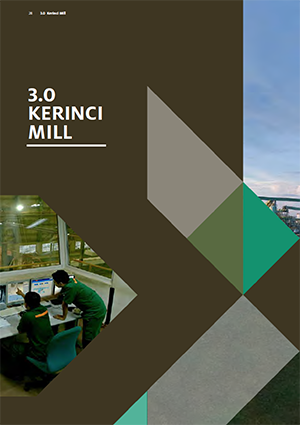APRIL’s objective is to establish an entirely plantation-based source of renewable plantation grown wood to supply the essential raw material needed to sustain our business and the livelihoods of those who depend on it. Developing the network of plantation estates to underpin the business has been an intensive undertaking since the inception of our company 19 years ago.
Acacia plantations in Indonesia take approximately 5-6 years from planting to reach maturity. As plantation-based fibre supplies sufficient to meet the requirements of the Kerinci mill are not yet fully mature, the mill sources a combination of plantation-derived fibre and mixed hardwood.
In the 2012 calendar year, 65 per cent of the timber consumed by the Kerinci mill was plantation wood (Acacia and Eucalyptus) and 35 per cent was mixed hardwood*. All wood was from legal sources.
Since mid-2012, all paper produced at Kerinci has been based on plantation sourced fibre.
Wood is supplied from APRIL’s own plantations, long term supply partners and community plantations (community fibre farms). As at 31 December 2012 community fibre farms occupied a combined gross area of 28,384 hectares, with the plantable areas within them totaling 19,640 hectares.
APRIL also maintains contractual supply arrangements with a range of limited-term suppliers who are subject to the requirements of APRIL’s responsible procurement policies.
For both supply partners and community fibre farms, APRIL provides advisory support and specific services to encourage good agricultural management and sustainable practices. For example, we provide partners with high-yield seedlings from our network of three central nurseries supplemented by satellite nurseries that together have the capacity to produce over 150 million plants per year. In 2012, APRIL enabled the planting of more than 130 million trees.
The company assists its long-term supply partners to develop and manage the land areas for which they are responsible to enable them to develop sustainable sources of renewable plantation fibre. Promoting the adoption of advanced forestry practices by supply partners whose operations will help sustain our business for the long term is a key element of APRIL’s business strategy.
We work with all long-term supply partners, over time, to encourage them to adhere to APRIL practices and to help improve their on-the-ground management capacity.
Long-term supply partners are encouraged to adopt standards similar to APRIL’s in land use planning, identification and protection of high conservation value (HCV) forest and community engagement. In particular we are working with these partners to take them through the process of HCV assessment.
APRIL maintains intensive dialogue with supply partners and discusses any supplier issues raised by external stakeholders with the supplier concerned, provides feedback and viewpoints and encourages actions by supply partners to address any problems identified.
Wood Purchase Policy
APRIL’s approach to the procurement and sourcing of wood fibre as feedstock for the Kerinci Mill is a responsible one.
Key elements of APRIL’s Wood Purchase Policy governing the sourcing of fibre include:
- Taking necessary measures to ensure that wood is properly checked and verified as being of legitimate source and origin before deliveries from any new supply source commence.
- Insisting that all suppliers and contractors comply with all licensing requirements and relevant rules and regulations related to cutting, transport or delivery of wood raw materials to the mill.
- Immediately warning any suppliers identified as violating relevant legal requirements and/or the provisions of APRIL’s Wood Purchase Policy.
- Ceasing purchasing from suppliers who disregard applicable licensing and regulatory requirements.
- Ensuring that all our employees responsible for the procurement, purchase, and acceptance of wood delivered to or used as raw materials for the pulp and paper mill are properly informed and trained to enforce the provisions of APRIL’s Wood Purchase Policy.
- Taking disciplinary action, including potential termination, against any staff found violating the Wood Purchase Policy.
APRIL has a clear position against illegal timber use. Our policies dictate that only legal wood can be purchased for use in our mill. To maintain the integrity of our wood supply procedures, we have implemented a third party-audited Chain of Custody system to ensure the legality of the timber we use.
Suppliers are required to demonstrate that they have all necessary permits including valid cutting permits, transport permits etc. APRIL has a zero tolerance approach to illegally harvested wood being supplied to our mill.
A plantation wood CoC System is used to track the origin of products sold by APRIL. This system ensures that plantation wood is strictly segregated from mixed hardwood, from the supply source through to production.
The plantation CoC System is regularly audited by auditors from national and international accredited, independent certification bodies against the implemented standards; PEFC CoC, OLB CdC, SVLK, LEI. These audits confirm that the system is effectively implemented, thus assuring customers of the effective segregation of plantation wood from mixed hardwood in the entire production process and they ensure the legality of the wood.
The range of national and international certifications held by APRIL that provide end-to-end assurance are described in section 4.10 of this Report.
We assist our partners to develop and manage the land areas for which they are responsible to enable them to develop sustainable sources of renewable plantation fibre to underpin the future of our pulp and paper manufacturing operations.
Production Information Management System
APRIL has designed and implemented a system known as the Production Information Management System (PIMS) for tracing wood from APRIL’s forest management units (FMUs) to the mill-site.
PIMS maintains records necessary for internal and external auditors to verify compliance to legal requirements.
PIMS is based on a Geographic Information System (GIS), linked to databases that include information on plantation stock, inventories, operational status, orders and costs.
The company also maintains a database of all licences and permits required to harvest and transport wood. Our system and processes aim to ensure that our entire supply meets legal requirements as well as APRIL’s wood sourcing criteria.
The aim of these systems is to ensure that wood is legally harvested and that harvesting does not violate traditional and civil rights, take place in forests where high conservation values could be threatened by management activities, or occur in forests in which genetically modified trees are planted.
Any such sources identified are excluded from APRIL’s supply chain.

